|
|
|||||
|
|
|
University Hosts RoboCup American Open '03 �
Robots, Researchers Converge on Campus for American Open '03
�
�
�More than 150 researchers, mostly from North and South America, and their autonomous, soccer-playing robots will meet on campus from April 30 to May 4, 2003, to compete in the International RoboCup Federation's first American Open. RoboCup is an international research and sports initiative founded to push the boundaries of science in artificial intelligence and intelligent robotics.
This is only the second time in RoboCup's seven-year history that a competition will take place in the Americas. RoboCup 2001 was held in Seattle and attracted 110 teams from 25 countries. Last year's international games, staged in Fukuoka, Japan, attracted teams from 29 countries and more than 117,000 spectators. This year, 390 teams are registered to play in Padua, Italy, July 2-12.
The teams that will meet at Carnegie Mellon come mainly from institutions in Canada, the United States, Puerto Rico, Mexico and South America. Some will compete in the Small-Size Robot League using color-coded wheeled robots about 10 inches square. Others will participate in the Sony Legged Robot League, played with Sony AIBO robots. Carnegie Mellon currently holds the world championship in the Legged League. Participants in the Simulation League will play each other on computers while the action is broadcast for viewing on large overhead screens. Teams from as far away as China, Iran and Australia will be competing in the Simulation League.
There also will be a special competition and demonstration featuring urban search-and-rescue robots. This event will be staged in a two-story-high disaster site created by experts at the National Institute of Standards and Technology and built by Carnegie Mellon scientists. The site will be housed permanently at the university, giving researchers a venue to work and experiment as they develop "a whole new species of robot" for search and rescue.
While the RoboCup competition is taking place, the university will also be hosting ASIMO, the world's most advanced humanoid robot, developed by Honda Motor Co., Ltd. ASIMO is currently visiting major cities across the U.S. on the "Say Hello to ASIMO" North American Educational Tour. ASIMO will be demonstrated for school children during the April 30-May 3 visit.
More than a thousand middle and high school students from across Western Pennsylvania are expected to visit the university to see the robot soccer matches, meet ASIMO and attend demonstrations of various other robots.
The American Open and visit from ASIMO will be open to the public May 2-4.
The American Open is chaired by Computer Science Professor Manuela Veloso, who is also a vice president in the International RoboCup Federation. She noted that the American Open is one of four such events taking place worldwide.
"Germany and Japan have had Opens for the past two or three years," Veloso said. "Australia also has an Open. Now it's time to have an Open to bring together teams in the Americas doing this kind of research. Our continents have less representation in the RoboCup than Europe or Asia.
"Our focus," she continued, "is on promoting robot soccer as a research paradigm within the Americas. In addition to the competitions,we will be running exhibitions, challenge events (challenging problems for single "robots or small teams) and a Robot Talent Show."
Veloso is currently working with her colleague Brett Browning, a systems scientist in the Robotics Institute, and an exceptional group of graduate and undergraduate students in the School of Computer Science (see next page).
Carnegie Mellon, a pioneer in the development of soccer-playing robots to investigate team learning, has participated in the International RoboCup competition since its inception in 1997. Carnegie Mellon's soccer-playing robots have won several world titles in various leagues and were world champions in every league in which they participated in 1998.
More information about the American Open, RoboCup and ASIMO's visit is available in this special section of the Carnegie Mellon News and at www.robocup.org and www.americanopen03.org.
The ultimate goal of RoboCup is to develop a team of fully autonomous humanoid robots that can defeat the human world champion team in soccer by 2050. In order for a robot team to actually play a soccer game, various technologies must be incorporated, including design principles of autonomous agents, multi-agent collaboration, strategy acquisition, real-time reasoning, robotics and sensor-fusion. RoboCup is a task for a team of multiple, fast-moving robots in a dynamic environment. It also offers a platform for software research.
The technology developed for RoboCup can be applied to a wide range of real-world problems.
One of the major applications of RoboCup technologies is search and rescue in large-scale disaster. RoboCup initiated RoboCupRescue to specifically promote research in socially significant issues.
Carnegie Mellon participates in three RoboCup leagues—the Simulation, Small-Size and Sony Legged leagues.
Researchers to Demonstrate Search-and-Rescue Robots
�
Carnegie Mellon researchers will demonstrate teams of urban search-and-rescue robots in a special "disaster arena" developed by the National Institute of Standards and Technology (NIST) during the RoboCup American Open on campus.
Search-and-rescue demonstrations will take place hourly May 2 and 3 in Rangos Hall in the University Center.
The semi-autonomous, interactive, teleoperated robots will be put through their paces in a two-level site replete with dim lighting and lifelike mannequins that give off heat and carbon dioxide and utter cries of distress so that the robots working with human rescuers can find them. The disaster arena, one of only three of its kind in the world today and the only one housed at a U.S. university, simulates the challenging environments robots may encounter when searching for disaster victims.
"It's a human-robot disaster team," said Illah Nourbakhsh, assistant professor of robotics and one of the organizers of this event. "We're designing robots that will demonstrate the convergence of robot design and artificial intelligence."
Nourbakhsh is one of three scientists who received a National Science Founda-tion grant to conduct urban search-and-rescue research. The others are Katia Sycara, principal research scientist in the Robotics Institute, and Michael Lewis, associate professor of information sciences at the University of Pittsburgh.
Demonstration attendees will be able to control a robot as it searches for victims, and researchers will compile data from their experiences to help determine their preferences and the success rates of various tools that could be used for search and rescue.
Nourbakhsh and his team have developed a new kind of search-and-rescue robot for this event that he calls "bicycle wheels with a brain." Others participating in the demonstrations are Howard M. Choset, associate professor of mechanical engineering who has developed snake-like robots proficient at working their way into hard to reach places, the university Robotics Club and a team from the University of Utah.
The RoboCup Soccer Simulator is a research and educational tool for multi-agent systems and artificial intelligence. It enables two teams of 11 fully distributed software agents to compete using the RoboCup Soccer Server. There are no actual robots in this league, but spectators can watch the action, which looks like a giant computer game, on a large screen. There is also a soccer coach simulation that allows one agent to teach or coach a team of 11.
�
�
RoboCup American Open '03 Draws International Competitors
�
Teams from across North and South America will be competing in the American Open. Here's a look at some of the teams and where they're from.
Mid-Sized Exhibition
Rescue Robot Exhibition
RoboCup Simulation Exhibition
RoboCup Junior
Small-Size Robots
Soccer Coach Simulation
Soccer Simulation
Sony Legged League
Friends of American Open '03
� �
�
Meet the People Behind the Soccer Robots
�
�
�Manuela M. Veloso, professor of computer science and head of the university's RoboSoccer program, will serve as general chair for the American Open.
Her long-term research goal is the effective construction of teams of intelligent agents in which cognition, perception and action are combined to address planning, execution and learning tasks, particularly in uncertain, dynamic and adversarial environments. To illustrate these concepts, she has developed teams of robot soccer agents designed to compete in different leagues of the International RoboCup Federation. Veloso and her students have successfully participated in the RoboCup competitions since 1997.
She is also vice-president of the International RoboCup Federation.
She has received several honors, including a National Science Foundation Career Award and the university's Finmeccanica Chair in 1995 and Carnegie Mellon's Allen Newell Medal for Excellence in Research in 1997.
Browning's research interests focus on adversarial multi-robot tasks. He has worked in the robotic soccer domain since 1998 and has helped, or led, the development of at least three different teams. As part of the CMDragons team, Browning has investigated how to integrate hardware and software for higher performance, development of robust behavior for a robot operating in a highly dynamic world, team coordination and control, and opponent modeling—all with the overriding goal of creating complete and autonomous systems.
�
Simulation League�
�
�
Small-Size League�
�
�
Sony Legged League�
�
�
�
Have You Said "Hello" to ASIMO?
�
��
Its name is ASIMO and it will be on campus April 30-May 3.
ASIMO (short for Advanced Step in Innovative Mobility) is the world's most advanced humanoid robot and was created specifically to help people. It can walk forward and backward, turn corners and even walk up and down stairs—all without losing its balance. With two arms and two hands, ASIMO can perform tasks like switching lights on and off, moving objects and opening or closing doors.
ASIMO's functionality is made possible through its 26 Degrees of Freedom, which are motors that act much like human joints. The degrees, installed in ASIMO's head, eyes, neck, torso, elbows, hands, mid-section, hips, legs, feet and knees, allow him to walk smoothly and with ease. It is powered by a 40-volt, nickel metal hydride battery that lasts for about 30 minutes and takes four hours to recharge. A laptop computer or portable computer controller unit is used to control ASIMO.
The following is a schedule of its performances. Doors open 15 minutes prior to the start of each performance.
Thursday, May 1
10-10:45 a.m. ASIMO
Friday, May 2
Saturday, May 3
Sunday, May 4
For more schedule information visit www.americanopen03.org/schedule/
�
�
Top�
�
�
|
|||
|
This Issue's Headlines || Carnegie Mellon News Home || Carnegie Mellon Home |
|||||
 RoboCup (originally called the Robot World Cup Initiative) is an international research and education initiative that fosters artificial intelligence (AI) and intelligent robotics research by providing a standard problem in which a wide range of technologies can be integrated and examined. It is also being used for integrated project-oriented education.
RoboCup (originally called the Robot World Cup Initiative) is an international research and education initiative that fosters artificial intelligence (AI) and intelligent robotics research by providing a standard problem in which a wide range of technologies can be integrated and examined. It is also being used for integrated project-oriented education.
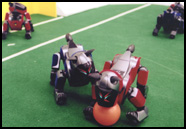 Teams of four Sony AIBO robots compete in a soccer game with full autonomy and wireless communication. The AIBO, which means "companion" in Japanese, is fully programmable and resembles a dog. Competitions and developments in the Legged League have advanced research efforts in real-time machine vision systems, robust robot localization methods, sensor integration and world modeling, robot locomotion and control, robotic behavior and planning systems, and online and offline robot learning.
Teams of four Sony AIBO robots compete in a soccer game with full autonomy and wireless communication. The AIBO, which means "companion" in Japanese, is fully programmable and resembles a dog. Competitions and developments in the Legged League have advanced research efforts in real-time machine vision systems, robust robot localization methods, sensor integration and world modeling, robot locomotion and control, robotic behavior and planning systems, and online and offline robot learning.
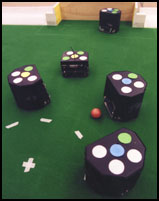 �Teams of five small robots on wheels, about 10 inches square, compete with off-board perception and remote computer control. The robots can organize themselves in formations, hold specific roles and pursue goals.
�Teams of five small robots on wheels, about 10 inches square, compete with off-board perception and remote computer control. The robots can organize themselves in formations, hold specific roles and pursue goals.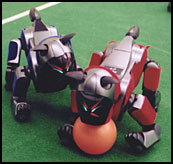 American Honda Motor Co., Inc.
American Honda Motor Co., Inc.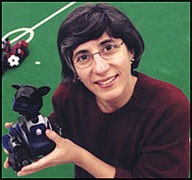 Veloso received her doctor's degree in computer science from Carnegie Mellon in 1992 after earning her bachelor's degree in electrical engineering and a master of science degree in electrical and computer engineering from the Instituto Superior Tecnico in Lisbon, Portugal.
Veloso received her doctor's degree in computer science from Carnegie Mellon in 1992 after earning her bachelor's degree in electrical engineering and a master of science degree in electrical and computer engineering from the Instituto Superior Tecnico in Lisbon, Portugal.
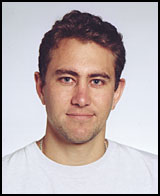 �
�Browning is a systems scientist in the Robotics Institute. He came to the university as a postdoctoral fellow working with Professor Manuela Veloso in August of 2000. He received his Ph.D. in electrical engineering, as well as his undergraduate degrees in electrical engineering and math, from the University of Queensland in Australia.
�
�Browning is a systems scientist in the Robotics Institute. He came to the university as a postdoctoral fellow working with Professor Manuela Veloso in August of 2000. He received his Ph.D. in electrical engineering, as well as his undergraduate degrees in electrical engineering and math, from the University of Queensland in Australia.
 �
Patrick Riley
�
Patrick Riley Dongryeol Lee
Dongryeol Lee Jared Go
Jared Go John Davin
John Davin Thuc Vu
Thuc Vu �
Michael Bowling
�
Michael Bowling Erick Tryzelaar
Erick Tryzelaar Dinesh Govindaraju
Dinesh Govindaraju James Bruce
James Bruce Douglas Vail
Douglas Vail Sonia Chernova
Sonia Chernova Juan Fasola
Juan Fasola Maayan Roth
Maayan Roth Scott Lenser
Scott Lenser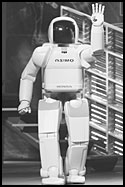 Honda's latest addition to the world of engineering doesn't sit on four tires and roll down the highway. Instead, it walks on two legs, has two arms, is about four feet tall and weighs 115 lbs.
Honda's latest addition to the world of engineering doesn't sit on four tires and roll down the highway. Instead, it walks on two legs, has two arms, is about four feet tall and weighs 115 lbs.
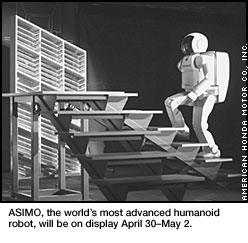 Currently, ASIMO's only North American application is the ASIMO North American Educational Tour, a traveling presentation designed to educate children and adults about humanoid robotics. In the future, though, it might someday serve as another set of eyes, ears and legs for people in need. ASIMO could also assist the elderly or people confined to beds or wheelchairs. It could even perform tasks that are dangerous to humans, like moving chemicals or fighting fires.
Currently, ASIMO's only North American application is the ASIMO North American Educational Tour, a traveling presentation designed to educate children and adults about humanoid robotics. In the future, though, it might someday serve as another set of eyes, ears and legs for people in need. ASIMO could also assist the elderly or people confined to beds or wheelchairs. It could even perform tasks that are dangerous to humans, like moving chemicals or fighting fires.
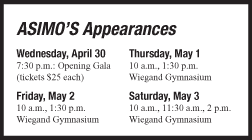
 Wednesday, April 30
Wednesday, April 30